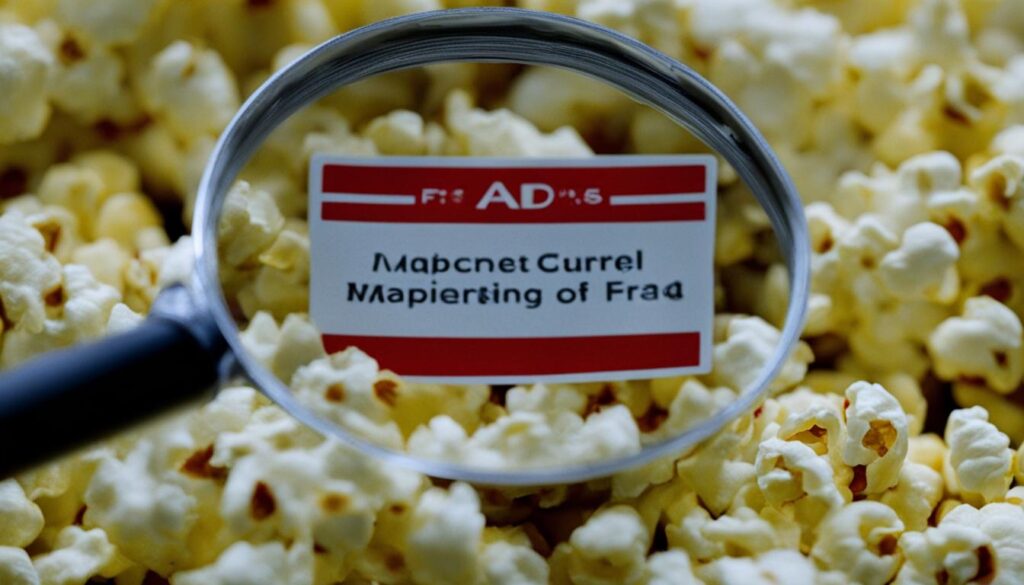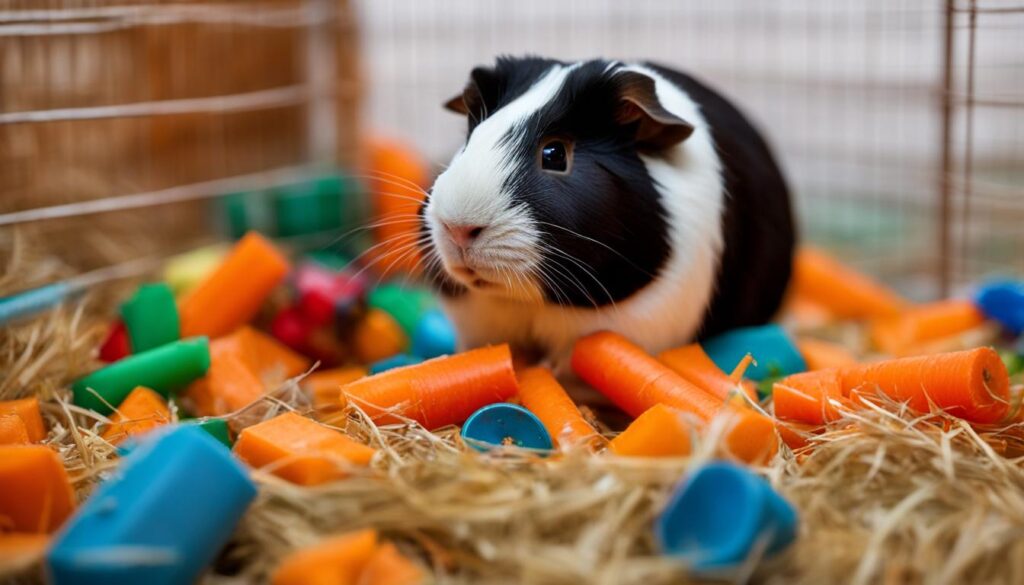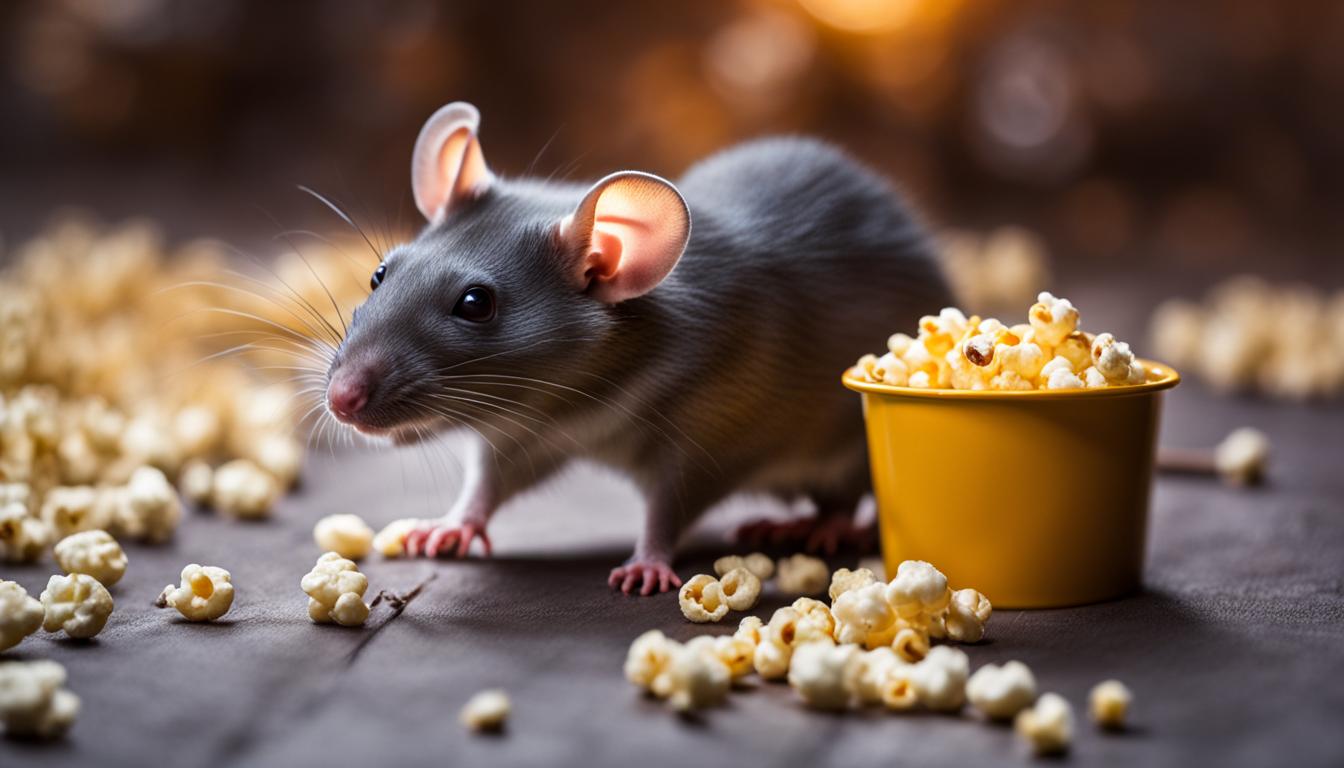Welcome to our guide for pet owners wondering if it’s safe to give their rats popcorn as a treat. Many people enjoy snacking on popcorn while watching a movie, but can our furry friends join in on the fun? Let’s find out!
Rats can safely enjoy plain air-popped popcorn, free from butter, salt, sugar, or other flavorings. However, it’s important to be mindful of the amount given to prevent obesity, as pet rats have a more sedentary lifestyle compared to their wild counterparts. Additionally, care must be taken to ensure that the tough hulls of popcorn don’t pose a choking hazard to rats. Stick to feeding them only the fluffy white part.
Buttered popcorn should be avoided entirely, as it is high in fat and salt, which can lead to obesity in rats. Salted popcorn can also cause dehydration, increased blood pressure, and kidney damage. However, when served in moderation, plain kernel-less popcorn can provide some health benefits, including vitamins B6 and E, fiber, iron, potassium, magnesium, and phosphorus. Furthermore, popcorn can be used as a treat to teach tricks and promote physical exercise for rats!
It’s important to note that a rat’s ideal diet consists of 80% commercially available pellets and the remaining 20% should include grains, vegetables, and other healthy foods. Some foods, such as caffeine, chocolate, apple seeds, lemon peels, raw red cabbage, green potato skins, and raw Brussels sprouts, should be avoided altogether. As always, moderation is key when feeding popcorn or any other treats to rats.
Key Takeaways:
- Rats can safely eat plain air-popped popcorn without butter, salt, sugar, or additional flavorings.
- Avoid buttered popcorn, as it is high in fat and salt, leading to obesity in rats.
- Salted popcorn can cause dehydration, increased blood pressure, and kidney damage in rats.
- Popcorn can provide some health benefits, including vitamins B6 and E, fiber, iron, potassium, magnesium, and phosphorus, but should be served in moderation.
- The ideal rat diet consists of 80% commercially available pellets and 20% grains, vegetables, and other healthy foods.
What Rodents Can Eat Popcorn?
A variety of rodents, including mice, rats, hamsters, chinchillas, and squirrels, can enjoy popcorn as a treat. However, it is important to feed them popcorn in moderation and make sure it is safe for their specific dietary needs. Here’s what you need to know about popcorn and these adorable furry friends.
Mice and Popcorn
Mice can safely eat plain air-popped popcorn without any additional ingredients. It is important to avoid popcorn kernels to prevent choking. Always ensure that the popcorn is fresh and does not have added salt, sugar, or flavorings. Remember to offer popcorn as an occasional snack and not a regular part of their diet.
Rats and Popcorn
Like mice, rats can also enjoy plain air-popped popcorn as a treat. However, it is essential to remove any kernels before offering it to them to prevent choking. Avoid buttered, salted, or flavored popcorn as they can be harmful to their health. Remember to feed popcorn in moderation as part of a balanced diet.
Hamsters, Chinchillas, and Squirrels
Hamsters can occasionally enjoy plain air-popped popcorn, but it should not make up a significant part of their diet. It is crucial to avoid popcorn kernels and flavored varieties as they can pose a choking hazard or cause digestive issues. Chinchillas can have popcorn as an occasional snack, but their main diet should consist of low-carbohydrate foods. Squirrels can also have plain air-popped popcorn, but it is important to avoid salted or flavored varieties as they can be harmful to their health.
Always remember to provide a balanced diet for your furry friends and consult with a veterinarian if you have any concerns about their dietary needs. Popcorn can be a fun and tasty treat for rodents, but it should never replace their staple diet of appropriate commercial pellets, grains, vegetables, and other healthy foods.
The Truth About Food Defects in Popular Snacks

When it comes to popular snacks, such as peanut butter, popcorn, and coffee beans, you may be surprised to learn about the permissible food defects allowed by the FDA. These defects include rodent hairs in peanut butter, insect parts in popcorn, and even moldy coffee beans. While it may sound unappetizing, these defects are considered economically impractical to remove completely and are not deemed harmful to consumers.
For example, did you know that a 17oz jar of peanut butter can legally contain up to five rodent hairs? Or that a 3oz bag of popcorn can have one rat poop pellet? Even a standard 1.5oz chocolate bar can contain up to 30 insect parts. These defects are often found in food during the harvesting of raw materials and the manufacturing process.
It’s important to note that these defects, although unsightly, are generally not a cause of foodborne illnesses. The FDA maintains a list of permissible food defects for various products, which is regularly updated. While it’s understandable to feel a bit grossed out by the idea of consuming these defects, rest assured that they are considered safe for consumption.
Permissible Food Defects in Popular Snacks:
- A 17oz jar of peanut butter can have up to five rodent hairs.
- A 3oz bag of popcorn can contain one rat poop pellet.
- A standard 1.5oz chocolate bar can contain up to 30 insect parts.
- Other permissible defects include moldy coffee beans and more.
While it’s always good to be aware of what we consume, it’s important to remember that these defects are a part of the FDA’s guidelines and do not pose a significant risk to our health. So, the next time you enjoy your favorite snacks, you can do so with the knowledge that a few food defects are nothing more than a small imperfection in an otherwise tasty treat.
Alternatives and Precautions for Rodents’ Diets

When it comes to the diets of rodents, there are many healthy food options available that can provide them with the nutrition they need. For rats, a balanced diet should consist of commercially available pellets, grains, and vegetables. Grains like walnuts and oatmeal can be included in their diet to provide essential nutrients and fiber. Additionally, vegetables such as broccoli, peas, parsley, carrots, and cabbage are great options to add variety and keep rats healthy.
Guinea pigs, on the other hand, should avoid popcorn due to their sensitive digestive systems. Instead, they can enjoy a range of fruits and vegetables such as mangoes, bananas, cherries, and strawberries. These can be given as treats or incorporated into their regular diet to ensure they receive the necessary vitamins and minerals.
Hamsters can have plain air-popped popcorn in moderation, but popcorn kernels and flavored varieties should be avoided. It is important to hamster-proof the home to prevent unsupervised access to popcorn or any other potential hazards. Chinchillas can also have popcorn as an occasional snack, but their diet should mainly consist of foods low in carbohydrates to prevent digestive problems.
Safe foods for guinea pigs:
- Mangoes
- Bananas
- Cherries
- Strawberries
Grains for rats:
- Walnuts
- Oatmeal
Vegetables for rats:
- Broccoli
- Peas
- Parsley
- Carrots
- Cabbage
By providing rodents with a balanced diet that meets their specific nutritional needs and avoiding toxic or dangerous foods, we can ensure that they stay happy and healthy. Remember to always introduce new foods gradually and not exceed ten percent of a rodent’s diet in treats. With proper care and attention to their diet, our furry friends can thrive and live a fulfilling life.
Conclusion
In summary, rats can enjoy the occasional treat of plain air-popped popcorn. However, it’s important to remember that moderation is key. Feeding them popcorn with added salt, sugar, butter, or flavorings can have negative effects on their health, so it’s best to stick to the plain variety. Popcorn can be a fun and interactive snack for rats, allowing us to teach them tricks and promote physical exercise. However, it should never replace their balanced diet.
When it comes to maintaining a healthy diet for rodents, there are many other options available. Grains, vegetables, and commercially available pellets should make up the majority of their food intake. These alternatives provide the essential nutrients that rats and other rodents need to thrive. It’s important to prioritize their nutritional needs and avoid feeding them any toxic or dangerous foods.
By offering a variety of rodent-friendly snacks and ensuring their diet is well-balanced, we can keep our furry friends happy and healthy. Remember to monitor their food intake, introduce new foods gradually, and provide them with plenty of fresh water. With the right care and attention, our rodent companions can enjoy a long and fulfilling life.
FAQ
Can rats safely eat popcorn?
Yes, rats can safely eat plain air-popped popcorn without butter, salt, sugar, or additional flavorings.
Can rats eat buttered or flavored popcorn?
No, it is best to avoid feeding rats buttered or flavored popcorn as it can lead to obesity and other health issues.
Are popcorn kernels safe for rats?
No, rats should only be fed the white fluffy part of popcorn to avoid the risk of choking.
What are the health benefits of popcorn for rats?
Plain kernel-less popcorn can provide rats with vitamins B6 and E, fiber, iron, potassium, magnesium, and phosphorous in moderation.
Can other rodents eat popcorn?
Yes, other rodents like mice, hamsters, chinchillas, and squirrels can eat plain air-popped popcorn in moderation.
Can guinea pigs eat popcorn?
No, popcorn should be avoided for guinea pigs due to their sensitive digestive systems.
What should be avoided in rodents’ diets?
Certain foods like caffeine, chocolate, apple seeds, lemon peels, raw red cabbage, green potato skins, and raw Brussels sprouts should be avoided.
How can I provide a balanced diet for rodents?
Rodents should have 80% commercially available pellets and 20% grain, vegetables, and other healthy foods in their diet.
What are the risks of food defects in popular snacks?
The FDA allows certain food defects in snacks, including rodent hairs in peanut butter, insect parts in popcorn, and moldy coffee beans. However, these defects are generally not harmful to consumers.
What are some alternatives to popcorn for rodents?
Rodents can also be fed grains like walnuts and oatmeal, as well as vegetables such as broccoli, peas, parsley, carrots, and cabbage.
How can I keep my home safe for rodents?
It is important to hamster-proof the home and prevent unsupervised access to popcorn or any other potential hazards.

Leave a Reply